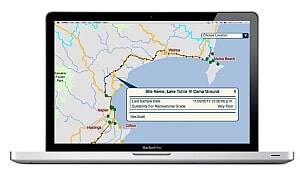Our relationship with the environment is dictated in many ways by the decisions and actions of our governing bodies. As citizens we have a say through council processes, and as individuals we make choices about how we live in our natural and built surroundings. But there are countless factors in our environment that directly affect the health and wellbeing of our community, and many of those we have no control over.
So who in officialdom is looking out for us and health impacts of our environment?
Dr Nicholas Jones is one of our three Medical Officers of Health at Hawke’s Bay District Health Board, each with a slightly different remit. Working alongside Dr Lester Calder and Dr Caroline McElnay, Jones’ focus is environmental health.
For Jones, four key issues influencing the health of Hawke’s Bay communities are housing, water, climate change and emergency preparedness. The big four.
When it’s suggested that perhaps The Big Four are too hard to tackle, even when you are the Medical Officer of Health, Jones is pragmatic.
“I don’t see it as me being the only person who’s responsible for this. I’m responsible for contributing to a bigger debate, and making sure it’s as informed as it can be from a health perspective. You need a lot of patience in this job because it could take years to see results of what you do.”
Environmental health advocate
Nicholas Jones has a career spanning 25 years; some in central government organisations; ten years working for the public health service in Auckland. In the mid-1990s Jones worked on a study of the risk factors of meningococcal meningitis. This led him to a heightened interest in environmental health, when the chief risk factor turned out to be overcrowding.
“That was an interesting piece of work and I suppose it inspired me to do more and become more interested in the effects of the environment on health,” says Jones.
In 2005 Jones was awarded a fellowship to study at the Centers for Disease Control and Prevention in Atlanta, Georgia in the US.
Much of his time there was spent looking at the measures of environmental health, and how elements such as urban design, air quality and transport can affect health outcomes, like obesity, heart disease, reproductive health and respiratory illnesses.
Jones was in the US for four years before coming to Hawke’s Bay in 2009 to take up his current role.
His work is primarily about assessing health risk, particularly in relation to various aspects of the environment. It’s also about advocating for measures that will reduce those risks or protect individuals that might be affected by them.
“I think of the environment at its most basic – air, water, soil – and as the physical environment that we come into contact with. But then there are also more complex aspects like the design of our towns and cities, buildings, our homes, our schools, transport, even the way in which food is sold. The retail spaces, and the types of food that are available can be seen as aspects of the environment that will affect our health,” Jones explains.
Within public health circles there has long been an understanding that councils are major players in public health. The decisions they make and the services they carry out have a tremendous impact on the local environment. Working closely with councils is therefore a key focus for Jones. But the buck doesn’t stop with council; community and individuals need to engage in the debate and the direction being taken by elected representatives.
“There’s a broader dialogue that goes on within community about the decisions we make collectively about how we want to develop, what policies should be in place, ensuring human health considerations are taken into account when we’re thinking about those things,” says Jones.
Climate change
For Nicholas Jones, climate change rises to the top of the list of concerns because of its potential to have huge impacts on most aspects of our lives, including the economy in Hawke’s Bay, as much of it is dependent on the climate.
On a more global level there’s emerging concern about how climate change may affect health outcomes, for example – the spread of infectious diseases beyond their traditional ‘borders’ (such as the mosquito adapting to carry malaria in places where it is not traditionally found), air quality effects from large scale fires and intensified urban air pollution, effects of more frequent, longer heatwaves or other extreme weather events, sustainable water supply and the prospects of climate refugees.
“[Climate change] is an important issue,” says Jones. “Is it something I can do a lot about in my day-to-day work? Not a great deal. It’s important for people working in environmental health to remind all of us that there are health issues associated with climate change, but what needs to be done to try and prevent it is a multi-country effort.”
Jones believes that what will emerge is a greater focus on how communities can adapt. It’s a two-pronged attack: How do we prevent those health effects from occurring? And, how do we make change so we can withstand the issues when they arise?
“It’s some way out in the future so it’s not something I’m going to be working on a lot on a daily basis but it’s definitely an important issue,” says Jones.
Not far out in the future say some experts. Global warming already contributes to more than 150,000 deaths and 5 million illnesses annually, according to World Health Organization studies.
Water
The multifaceted challenges of water came up as a chief focus for public health in the Supporting Healthy Communities Plan 2012-2015, pulled together by the Hawke’s Bay DHB. Included were impacts water has on health throughout its cycle, including drinking water, water supply and recreational water use.
In public health terms, drinking water is thought about in two dimensions: security of supply and quality, both microbiological and chemical.
With rural communities in particular there are risks to the water supply, especially in communities dependent on rainfall, who in some cases are already struggling to get sufficient water particularly in summer months. Security of supply is interlinked with climate change because Hawke’s Bay is expected to become drier in the future, and as it does it’s anticipated those problems will become greater.
“We work with communities to try and assist them. Part of that involves helping them access funds from the Ministry of Health for assistance in improving the quality of their water supplies.”
It is estimated that about 1,000 people in Hawke’s Bay are in communities at high risk in terms of secure, quality drinking water.
Says Jones: “One of the simple things people can do is have more storage, larger tanks. In a lot of communities we also look at putting in place a small system, either using water out of a stream, or out of a bore to supply that community and how can that be set up in a way that’s going to be sustainable, so that community will be able to operate the system themselves over time.”
Water also concerns rivers and lakes. Although testing and monitoring for problems like bacteria and cyanobacteria is done by the Hawke’s Bay Regional Council, Jones and his team work with them on interpreting the findings, assessing what the risks are and advising the public.
“My impression is we are making progress, but some of the issues, with lakes in particular, will take a long time to resolve. They are a legacy of some of the land use practices we’ve had in this region and the fact that we cut down a lot of trees [historically],” explains Jones.
There are also food aspects associated with water, as it’s used for growing shell fish and fin fish. Proximity to urban areas and waste water are both concerns, and Jones has been involved with reviewing the health effects of discharging sewage into Hawke Bay.
“There’s always the potential to take things further if you have to. At the end of the day the decisions around how we manage our waste water and how we deal with it as a population, that’s something we all have to decide, we all have to contribute to that discussion,” Jones says.
Housing
In all areas of social debate, housing raises its head. Dampness and mould are issues, as is crowding, which is associated with a lot of effects, particularly infectious diseases, rheumatic fever, TB, meningococcal disease and mental health.
“Children who live in cold damp houses, particularly when there is tobacco use indoors, are much more likely to get admitted to hospital with respiratory illnesses. That’s a concern for those families and those children but it’s also a concern for the DHB because it’s a lot of resource going into what is essentially preventable illness,” explains Jones.
The Hawke’s Bay DHB has been working with the primary health organisation and the regional council on trying to help families, particularly those in poorer neighbourhoods, to get assistance with insulation and aspects of the home that are causing moisture to be retained. There are questions around how much ‘The State’ should intervene, but the cost of housing and availability of good quality rentals are real issues, and all over the world governments, including our own historically, have invested in social housing.
Jones also believes there are issues in terms of the way our communities are designed and built. He advocates for urban designs that promote people getting out and walking, accessing public transport or using a bike rather than a car.
Emergency preparedness
In many ways emergency preparedness ties the other three key areas together. Certainly housing and water problems are critical issues in emergencies, but also, as we have seen in Canterbury, those who are struggling with the necessities of life anyway, when caught up in crisis are many furlongs further down the hill when it comes to recovery and rebuilding.
Climate change is also a major factor in natural disasters, as the type and magnitude, and arguably frequency, is interlinked with changes to weather patterns.
With a history marked by a natural disaster over 8o years ago, Hawke’s Bay is tuned in to civil defence. An element of Jones’ role is preparing Hawke’s Bay for earthquakes, tsunami, flooding, pandemic, or man-made disasters. Some emergencies are primarily a health concern; in other emergencies the role of public health is much more in support.
“I spend quite a lot of time working with councils, civil defence authorities and emergency services like police, fire and St Johns preparing for what we need to be doing in an emergency, and setting up policies and protocols so we can work together in a coordinated way,” Jones says.
Jones and his team are also involved in outbreaks of illness in daycares, schools and rest homes. Two or three times a year these are large scale events.
Editor’s Note:
Missing from Dr Jones’ environmental health priorities is the issue of fluoride in the region’s drinking water, which will be the focus of a sharply-contested referendum in the Hastings district later this year. A subject to which BayBuzz will return.




